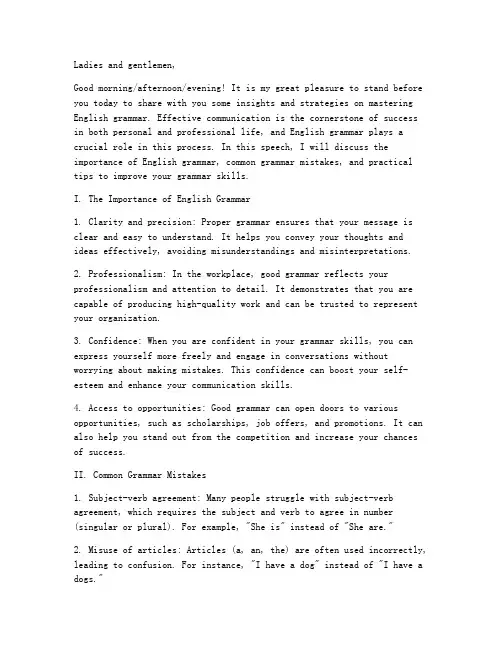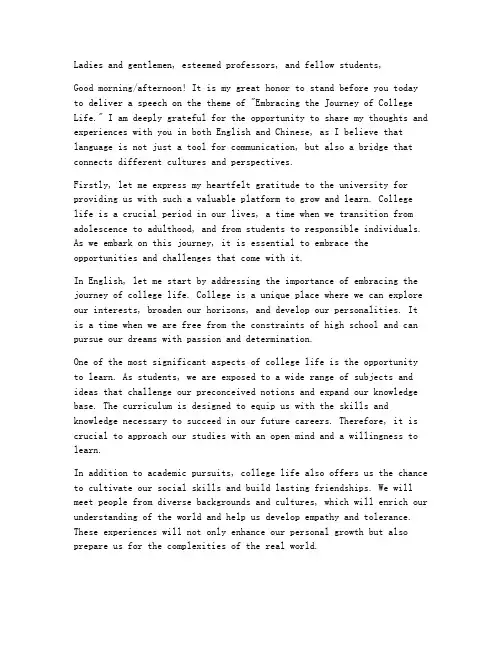大学英语语法专题讲座(双语)
语篇翻译主题知识讲座

nostalgia [nɔ'stældʒiə, nə-] n. 乡愁;怀乡病;怀旧之情
§ I saw the old apartment building where I had lived and the playground where I had played. As I viewed these once familiar surroundings, images of myself as a child there came to mind. However, what I saw and what I remembered were not the same I sadly realized that the best memories are those left undisturbed
围,但这么并不能限制我不断探索旳天性。
chute [ʃu:t] n. 斜槽;瀑布;降落伞;陡坡道
hatch [hætʃ] n. 舱口;孵化
confined [kən'faind adj. 幽禁旳;狭窄旳;有限制旳;在分娩中旳v. 限制
§There was a small branch in back of the building where my friends and I would play. We
My Old Neighborhood
§ Several years ago I returned to Washington, D.C., and visited one of my old neighborhoods. I had been on Nash Street for more than twenty years and as I walked along the street, my mind was flooded by waves of nostalgia.
大学英语双语演讲稿子范文

Ladies and gentlemen,Good morning/afternoon. It is my great honor to stand before you today to deliver a speech on a topic that is not only of great importance but also of immense relevance to our future – the role of international cooperation in tackling global challenges.As we all know, the world we live in today is interconnected like never before. Advances in technology, communication, and transportation have brought people closer together, making it impossible to isolate ourselves from the global community. However, with this interconnectedness comes a set of challenges that require the collective efforts of nations to address effectively.In this speech, I will discuss three main aspects of international cooperation: the need for collaboration, the challenges we face, and the potential benefits of such cooperation. I will conclude with some thoughts on how we, as university students, can contribute to this global endeavor.Firstly, let us consider the need for international cooperation. In the past few decades, the world has witnessed an unprecedented increase in the frequency and severity of global challenges. These challenges include climate change, economic inequality, public health crises, and geopolitical tensions, among others.Take climate change, for instance. The Intergovernmental Panel on Climate Change (IPCC) has warned that the Earth's temperature could rise by as much as 3.9 degrees Celsius by the end of this century if we do not take immediate and significant action. This rise in temperature will have catastrophic consequences for our planet, including rising sea levels, more frequent and severe natural disasters, and a loss of biodiversity.Similarly, the COVID-19 pandemic has highlighted the interconnectedness of our world and the importance of international cooperation. The virus did not recognize national borders and spread rapidly across the globe,affecting millions of lives and economies. Only through coordinated efforts and sharing of resources could we hope to combat such a crisis.These examples demonstrate that no single country or organization can address these global challenges alone. International cooperation is essential to pooling resources, sharing knowledge, and implementing solutions that are effective on a global scale.Secondly, let us examine the challenges we face in achieving international cooperation. One of the primary challenges is thediffering interests and priorities of nations. While some countries may prioritize economic growth, others may focus on social welfare or environmental protection. These differing priorities can lead to conflicts and hinder cooperation.Moreover, there is often a lack of trust among nations. Historical grievances, geopolitical rivalries, and ideological differences can create barriers to collaboration. In such situations, it becomesdifficult to reach consensus and work together towards common goals.Another challenge is the complexity of global governance structures. The United Nations, World Trade Organization, and other international organizations play a crucial role in facilitating cooperation. However, these structures can be slow, bureaucratic, and often lack the necessary authority to enforce agreements.Despite these challenges, the potential benefits of international cooperation are substantial. By working together, nations can achieve the following:1. Enhance global stability and security: Through cooperation, countries can address common threats such as terrorism, nuclear proliferation, and cyberattacks, thereby creating a more secure and stable world.2. Promote sustainable development: By sharing resources, technology, and knowledge, nations can work towards achieving the Sustainable Development Goals (SDGs) and improve the quality of life for all people.3. Foster innovation and economic growth: Collaboration betweencountries can lead to the development of new technologies and industries, creating job opportunities and boosting economic growth.4. Strengthen cultural understanding and harmony: Through international exchanges and collaborations, people from different cultures can learn from one another, fostering mutual respect and understanding.Finally, as university students, we have a unique opportunity to contribute to international cooperation. We can do so by:1. Promoting global awareness: By learning about different cultures, histories, and perspectives, we can become more informed and empathetic global citizens.2. Engaging in research and innovation: We can conduct research onglobal issues and contribute to the development of solutions through our academic pursuits.3. Participating in international programs: By taking part in study abroad programs, internships, and conferences, we can gain firsthand experience of different cultures and build networks that can facilitate future collaborations.4. Advocating for change: We can use our voices to raise awareness about global challenges and advocate for policies that promote international cooperation and sustainable development.In conclusion, the role of international cooperation in tackling global challenges cannot be overstated. As we face an increasingly interconnected world, it is crucial that we work together to address the challenges that threaten our planet and our future. By promoting global awareness, engaging in research and innovation, participating in international programs, and advocating for change, we, as university students, can play a significant role in shaping a more cooperative and sustainable world.Thank you for your attention. I look forward to your questions and comments.---Note: This speech is intended to be delivered in English and can be adapted for a bilingual audience by including Chinese translations or explanations where necessary. The length of the speech is approximately 1500 words, and it can be further expanded or condensed depending on the time allocated for the speech and the audience's familiarity with the topic.。
英语语法分享演讲稿范文

Ladies and gentlemen,Good morning/afternoon/evening! It is my great pleasure to stand before you today to share with you some insights and strategies on mastering English grammar. Effective communication is the cornerstone of success in both personal and professional life, and English grammar plays a crucial role in this process. In this speech, I will discuss the importance of English grammar, common grammar mistakes, and practical tips to improve your grammar skills.I. The Importance of English Grammar1. Clarity and precision: Proper grammar ensures that your message is clear and easy to understand. It helps you convey your thoughts and ideas effectively, avoiding misunderstandings and misinterpretations.2. Professionalism: In the workplace, good grammar reflects your professionalism and attention to detail. It demonstrates that you are capable of producing high-quality work and can be trusted to represent your organization.3. Confidence: When you are confident in your grammar skills, you can express yourself more freely and engage in conversations without worrying about making mistakes. This confidence can boost your self-esteem and enhance your communication skills.4. Access to opportunities: Good grammar can open doors to various opportunities, such as scholarships, job offers, and promotions. It can also help you stand out from the competition and increase your chances of success.II. Common Grammar Mistakes1. Subject-verb agreement: Many people struggle with subject-verb agreement, which requires the subject and verb to agree in number (singular or plural). For example, "She is" instead of "She are."2. Misuse of articles: Articles (a, an, the) are often used incorrectly, leading to confusion. For instance, "I have a dog" instead of "I have a dogs."3. Confusing homophones: Homophones are words that sound the same but have different meanings and spellings. Common examples include "there, their, and they're" or "your, you're, and your."4. Incorrect prepositions: Prepositions are used to show relationships between nouns, pronouns, and other words in a sentence. Many people make mistakes when using prepositions, such as "in" instead of "on" or "between" instead of "among."5. Split infinitives: A split infinitive occurs when there is a word or phrase inserted between the "to" and the "infinitive" verb. While it is not considered a grammatical error, some people believe it to be incorrect. For example, "to quickly leave" instead of "to leave quickly."III. Practical Tips to Improve Your Grammar Skills1. Practice regularly: Like any other skill, improving your grammar requires consistent practice. Dedicate time each day to review grammar rules and practice writing sentences.2. Read extensively: Reading books, articles, and other materials in English exposes you to different grammar structures and styles. Pay attention to how authors use grammar to convey their message.3. Use grammar resources: Invest in a good grammar handbook or downloada grammar app. These resources can provide you with explanations and examples of grammar rules.4. Write and proofread: Write short essays, stories, or emails and proofread them carefully. Pay attention to your grammar mistakes and correct them before submitting your work.5. Seek feedback: Share your writing with friends, family, or teachers to receive constructive feedback on your grammar usage.6. Join a study group: Studying grammar with others can provide motivation and accountability. You can also learn from each other's mistakes and discuss challenging grammar topics.7. Practice listening and speaking: Listening to native speakers and practicing your speaking skills can improve your understanding of grammar in context.In conclusion, mastering English grammar is essential for effective communication. By understanding the importance of grammar, being aware of common mistakes, and implementing practical tips to improve your skills, you can enhance your communication abilities and achieve your personal and professional goals.Thank you for your attention, and I hope this speech has been helpful in your journey towards mastering English grammar.。
大学英语双语演讲稿

Ladies and gentlemen, esteemed professors, and fellow students,Good morning/afternoon! It is my great honor to stand before you today to deliver a speech on the theme of "Embracing the Journey of College Life." I am deeply grateful for the opportunity to share my thoughts and experiences with you in both English and Chinese, as I believe that language is not just a tool for communication, but also a bridge that connects different cultures and perspectives.Firstly, let me express my heartfelt gratitude to the university for providing us with such a valuable platform to grow and learn. College life is a crucial period in our lives, a time when we transition from adolescence to adulthood, and from students to responsible individuals. As we embark on this journey, it is essential to embrace the opportunities and challenges that come with it.In English, let me start by addressing the importance of embracing the journey of college life. College is a unique place where we can explore our interests, broaden our horizons, and develop our personalities. Itis a time when we are free from the constraints of high school and can pursue our dreams with passion and determination.One of the most significant aspects of college life is the opportunity to learn. As students, we are exposed to a wide range of subjects and ideas that challenge our preconceived notions and expand our knowledge base. The curriculum is designed to equip us with the skills and knowledge necessary to succeed in our future careers. Therefore, it is crucial to approach our studies with an open mind and a willingness to learn.In addition to academic pursuits, college life also offers us the chance to cultivate our social skills and build lasting friendships. We will meet people from diverse backgrounds and cultures, which will enrich our understanding of the world and help us develop empathy and tolerance. These experiences will not only enhance our personal growth but also prepare us for the complexities of the real world.Now, let's delve into the Chinese perspective. 在中国,大学生活同样具有举足轻重的地位。
语法讲座8

can, may, must 的用法
can, may, must 有三种意义和用法: 首先是由它们各自的词汇意义所决定的基本用 法(can 能够;may 许可;must 必须); 其次是表示“概率、可能性”的意义和用法; 第三是表示“揣测、推测”的意义和用法。
can, may, must 的用法
3、表示“揣测”
2) may /might
一般只用于肯定句。might 既可表示过去时,也可表示比 may 更不肯定。 (1) 对现在情况表示揣测,结构为 may (might) + 动词原形 (状态动词),或 may(might) + be + 现在分词 (行为动词)。 例如: John may know Professor Smith’s E-mail address. 约翰也许知道史密斯教 授的电子邮件地址。 This might be the key that Jim has been looking for. 这可能就是吉姆在找的 钥匙。 He may be using the book now. 他也许在用着这本书呢。 (2) 对已经发生的情况表示揣测,结构为 may(might) + have + 过去分词。 例如: The train may have left already. 火车可能已经开走了。 They might have been there before. 他们以前可能到过那儿。
3、表示“揣测”
3) must 只用于肯定句,语气比 may / might肯定得多,肯定性推测。 (1) 对现在情况表示揣测,结构为 must + 动词原形 (状态动词),或 must + be + 现在分词 (行为动词)。 例如: He must be sick for he looks so pale. 他一定是病了,因为他看起来是那 么苍白。 Judging from your accent, you must be a southerner. 从你的口音来判断, 你肯定是南方人。 It must be raining outside. 外面一定在下雨。 (2) 对已经发生的情况表示肯定性揣测,结构为 must + have + 过去分词。 例如: It must have rained last night. The ground is wet. 昨晚一定下雨了。地上 湿漉漉的。 I think my letter must have been miscarried. 我想我的信一定是误投了。
英语专业四级语法TEM4语法讲座省公开课金奖全国赛课一等奖微课获奖PPT课件

• 3.由同一动词组成短语如:come,go,set,break • 4.单个动词,抽象名词,形容词和副词多以近义词、同义词形式出
• 5.介词短语在句中作状语如:in terms of;with the exception of; in vain等,另外还应注意rather than,other than,such as,none /nothing+but
16/125
A.2 识别记忆同音异形异义词
• bear(熊)———bare (裸露), been (be过去式)———bean(蚕豆), • meet———meat, blew (blow过去式)———blue, cellar—seller, • higher———hire (雇用), write———right ,bread———bred (breed
• 2、表示否定意义前缀 (1)纯否定意义前缀有in-,dis-,non-,un-等,表示“无,非,不”之意, informal(非正式),dishonest(不老实),non-effective(无效 力),uncomfortable.(不舒适)等。 (2)表示错误意义前缀有mis-,(误,恶),mal-(坏)等 mis-understand (误解),malediction(诽谤)等。 (3)表示相反动作前缀有dis-(否定,相反),de-(离开,除去),un-(不,无)等,
过去式), • dear———deer(鹿), fined (fine过去式)———find, • flour(面粉)———flower , hall———haul(拖,曳), fir(冷却)———
如何学好英语的讲座英语
如何学好英语的讲座英语IntroductionGood afternoon everyone and thank you for joining me today for this special lecture on how to master the English language. English is arguably the most widely spoken and understood language in the world, and the ability to communicate effectively in English can open up countless opportunities for personal and professional growth. In this lecture, we will explore the key strategies and techniques that you can use to improve your English skills and become fluent in the language. Whether you are a beginner or an advanced learner, this lecture will provide you with valuable insights and practical tips that will help you on your journey to mastering English. So without further ado, let's get started!The Importance of English ProficiencyBefore we delve into the specifics of language learning, let's first discuss why it is important to master English. As I mentioned earlier, English is a global language that is spoken by millions of people around the world. It is the language of international business, diplomacy, and academia, and being proficient in English can give you a competitive edge in today's globalized world. Whether you are looking to advance your career, study abroad, or simply communicate with people from different countries, having a strong command of English can greatly enhance your life and opportunities.In addition to the practical benefits of mastering English, there are also cognitive benefits to language learning. Learning a new language can improve your memory, enhance your problem-solving skills, and even delay the onset of cognitive decline in old age. So by committing to mastering English, you are not only expanding your linguistic abilities, but also sharpening your mind and enhancing your overall cognitive function.Now that we have established the importance of English proficiency, let's move on to the key strategies that you can use to improve your English skills and become fluent in the language.Setting Clear GoalsThe first step in mastering English is to set clear and realistic goals for your language learning journey. Whether your goal is to achieve fluency in speaking, improve your reading comprehension, or pass a language proficiency exam, having a clear objective in mind will help you stay motivated and focused on your learning. It is important to set specific, measurable, achievable, relevant, and time-bound (SMART) goals that will guide your learning and keep you on track.For example, if your goal is to improve your English speaking skills, you can set a goal of having a conversation in English with a native speaker within six months. This goal is specific, measurable (you will know when you have achieved it), achievable (with practice and dedication), relevant to your overall language learning objectives, and time-bound(within six months). By setting goals that are SMART, you can track your progress, stay motivated, and ultimately achieve fluency in English.Immersing Yourself in the LanguageOne of the most effective ways to improve your English skills is to immerse yourself in the language as much as possible. This means surrounding yourself with English language materials, such as books, movies, TV shows, music, podcasts, and websites. By exposing yourself to English on a regular basis, you will start to pick up the language naturally and internalize its patterns and structures.Reading English books and articles is a great way to improve your vocabulary and comprehension skills. Choose books that are at your current reading level, but also challenge you to learn new words and grammatical structures. You can also read English newspapers, magazines, and websites to stay up-to-date on current events and expand your knowledge of the language.Watching English movies and TV shows is another effective way to immerse yourself in the language and improve your listening skills. Choose movies and shows that you enjoy and try to watch them without subtitles to challenge yourself and improve your listening comprehension. Pay attention to the dialogue, accents, and expressions used by the actors, and try to mimic their pronunciation and intonation.Listening to English music and podcasts is another great way to expose yourself to the language and improve your listening skills. Choose songs and podcasts that you like and listen to them regularly to familiarize yourself with the rhythm and flow of English. Pay attention to the lyrics, pronunciation, and intonation of the singers or speakers, and try to sing along or repeat phrases to practice your pronunciation.Speaking and PracticingOne of the most important aspects of mastering English is practicing speaking with others. Speaking is a skill that can only be developed through practice and repetition, so it is important to find opportunities to engage in conversations in English. Whether you practice with a language partner, a tutor, or a native speaker, speaking regularly will help you improve your fluency, pronunciation, and confidence in using the language.One effective way to practice speaking is to find a language partner who is also learning English and practice speaking with them on a regular basis. You can meet in person, over the phone, or online via video chat platforms such as Skype or Zoom. Schedule regular practice sessions with your language partner and take turns speaking in English on a variety of topics. This will help you improve your conversational skills, expand your vocabulary, and gain confidence in using English.Another option is to hire a language tutor who can provide personalized instruction and feedback on your speaking skills. A tutor can help you identify areas for improvement,correct your pronunciation, and provide guidance on grammar and vocabulary usage. By working with a tutor on a regular basis, you can accelerate your language learning and make steady progress towards fluency in English.If you have the opportunity, try to engage in conversations with native English speakers to practice your speaking skills in a real-world setting. Whether you are traveling abroad, participating in a language exchange program, or attending English-language events in your community, take advantage of any opportunity to practice speaking with native speakers. Native speakers can provide valuable feedback on your speaking skills, introduce you to colloquial expressions and slang, and help you gain confidence in using English in a social context.Improving Your Writing SkillsIn addition to speaking, it is also important to focus on improving your writing skills in English. Writing is an essential aspect of language learning that can help you reinforce your understanding of grammar and vocabulary, as well as develop your critical thinking and communication skills. By practicing writing regularly, you can become more confident in expressing your ideas in English and develop a clear and coherent writing style.One way to improve your writing skills is to keep a journal in English where you can write down your thoughts, reflections, and experiences in the language. Writing in a journal is a low-pressure way to practice your writing skills and experiment with different expressions and styles. Set aside some time each day to write in your journal and challenge yourself to use new words and sentence structures to expand your vocabulary and improve your writing fluency.Another effective way to practice writing is to participate in online forums, blogs, or social media platforms where you can interact with other English speakers and share your thoughts and ideas. Joining online communities can provide you with opportunities to practice writing in English, receive feedback from other users, and engage in meaningful conversations on a variety of topics. By regularly writing and interacting with others online, you can improve your writing skills, expand your vocabulary, and gain confidence in expressing yourself in English.Taking Language Classes and CoursesWhile self-study and immersion are important components of language learning, taking formal language classes and courses can also be highly beneficial in improving your English skills. Language classes provide structured instruction, guided practice, and real-time feedback from experienced teachers, which can help you develop a solid foundation in English and make significant progress in a short period of time.There are many options available for language classes and courses, ranging from traditional in-person classes at language schools or universities, to online courses and tutoring services that can be accessed from anywhere in the world. When choosing a language class or course,consider your learning style, schedule, and budget, as well as your specific language learning goals and objectives.In addition to traditional language classes, there are also a wide range of online resources and tools that you can use to supplement your learning and practice your English skills. Online language learning platforms such as Duolingo, Rosetta Stone, and Babbel offer interactive lessons, quizzes, and exercises that can help you improve your grammar, vocabulary, and pronunciation. These platforms also provide opportunities to practice speaking, listening, and writing in English, as well as track your progress and receive personalized feedback on your performance.Another option is to enroll in a language exchange program where you can practice speaking with native speakers in exchange for helping them learn your native language. Language exchange programs provide a mutually beneficial opportunity for language learners to practice their language skills and make new friends from around the world. By participating in a language exchange program, you can improve your speaking and listening skills, gain cultural insights, and build meaningful connections with other language learners.Staying Motivated and ConsistentFinally, one of the most important aspects of mastering English is to stay motivated and consistent in your language learning efforts. Learning a new language can be challenging and time-consuming, so it is important to stay positive, set realistic expectations, and maintain a consistent study routine to achieve your language learning goals.One way to stay motivated is to set mini-goals or milestones that you can achieve along the way to your ultimate goal of mastering English. Celebrate your progress, no matter how small, and reward yourself for reaching each milestone. Whether it's completing a chapter in a textbook, having a conversation in English with a native speaker, or passing a language proficiency exam, acknowledge your achievements and use them as motivation to keep moving forward in your language learning journey.Another way to stay motivated is to make language learning a fun and enjoyable experience. Find ways to incorporate English into your daily routine, such as listening to English music while exercising, watching English movies or TV shows while relaxing, or reading English books or articles before bed. By integrating English into your daily life in a way that is enjoyable and rewarding, you can maintain your interest and enthusiasm for learning the language.In addition to staying motivated, it is also important to maintain a consistent study routine to make steady progress in your language learning. Set aside dedicated time each day or week to study English, practice your skills, and review what you have learned. Consistency is key to language learning, so make a commitment to prioritize your English studies and stick to your study schedule to achieve your language learning goals.ConclusionIn conclusion, mastering English is a rewarding and valuable endeavor that can open up countless opportunities for personal and professional growth. By setting clear goals, immersing yourself in the language, practicing speaking and writing, taking language classes and courses, and staying motivated and consistent in your language learning efforts, you can improve your English skills and become fluent in the language.Remember that language learning is a journey that requires dedication, perseverance, and patience, so be kind to yourself and celebrate your progress along the way. With determination, effort, and a positive attitude, you can achieve fluency in English and unlock the many benefits that come with being proficient in the world's most widely spoken language.Thank you for joining me today for this special lecture on how to master English. I hope you have found the information and tips provided in this lecture to be helpful and inspiring in your language learning journey. Good luck and happy learning!。
语法讲座2012(1)
归纳教学策略
• 教学过程强调从个体到一般:先接触含有 语法规则的材料,观察其规则,概括归纳 成规则,之后大量练习。
• 倾向于发现性学习活动,符合语言习得的 自然顺序,有利于培养学习者探索精神, 调动学习主动性和积极性,形成学习内在 动机
Which is better?
• 两者有机结合,归纳为主,适当演绎
Pedro: Well, no more lessons now until after Christmas. It’s nice to think that holidays have started. This time on Friday I shall be just about leaving the French coast and getting over the Bay of Biscay. What will you be doing, Lucille? Lucille: Let me see; it’s seven o’clock now. Yes, at seven o’clock tomorrow I shall be going to a party at a friend’s house in Canterbury. Olaf: Are you going by car ?
• 根据学习者特点、学习目的、语言点难易 程度的不同而不同。
语法教学中应注意的问题
1)规则的讲解和练习先于语言的接触和输入
2)让活的语言来适应死的语法 3)缺乏英汉语言结构的比较 4)语法练习和真实的交际情景脱节
1)规则的讲解和练习先于 语言的接触和输入?
Think and compare
Unit 2 M4 Grammar and usage
英语语法第一课
语的动作和状态的。
• 3.表语(predicative)它是放在连系动词之
后表示主语的身份或特征的。表语也就是 主语补语。补语(complement)分为主语补 语和宾语补语。
• 4.宾语(object)它是表示及物动词动作的
对象的。
• 5.定语(attribute)它是限定或修饰名词或
English Grammar 英语语法 第一讲
1.语法是什么? (What is grammar? )
• 语法是语言的组织规律, 它赋予语言以结构
系统。(the entire system of a language, including its syntax, morphology, semantics, and phonology)
• 7.冠词(article, 缩写为art.) 说明名词所指的
人或物的词。An article is a name for the (definite article) and a, an (indefinite
article).
• 8.介词(preposition,缩写为prep.) 表示名词
• 4.他是我的顶头上司。 • He is above me. • 5.微积分对我来说太难了。 • Calculus was always beyond me. • 6.你打这个电话就能找到我。 • You can reach me at this phone number.
4. How does that song go?
• 具体地讲, 主要有下列六种句子成分。
• 1. 主语(subject)它是句子所要说明的人
或事物, 是一句的主体。The subject is the part of the sentence that names whom or
大学英语语法(全)PPT课件
38
• 2、天气糟透了。整天刮大风下大雨的。 The weather was so bad. It blew hard and rained heavily all the day.
(翻译时必须补出主语It。)
15
• 这位父亲问他女儿的男朋友(其正准备开车带他 女儿出门):Do you drink?他真正的意思是问这 个年轻男子是否有饮酒的习惯,即在询问情况, 而不是问他现在想不想喝酒,即不是在提议。
16
• 因此,从交际的角度去看待语法,在具体语境中考 查语法规则的使用,通过语篇、语境驾驭语法来达 到十分具体的交际目的。我们不仅知道“应该”怎 么说(what learners should say),更应该去了解为 什么英语本族语者要“这样”说(what native speakers of English actually do say and why)。
5
语法的三个层面:形式、意义、用法
• 形式:某个语法结构怎样构成的。比如 “现在完成进行时”的结构形式是have been doing。这是使用语法规则的起点, 即首先要做到能够准确地构造某个语法结 构,这是语法结构的准确性问题。
6
• 意义:某个语法结构表达的意义。比如“现在完成 进行时”可以表示“一个活动从过去一直延续到现 在说话时刻”这样的含义,这就是现在完成时态这 一结构所具备的语法意义。由此可以看出,特定意 义一般是对应于特定的结构形式的,或者说,特定 的结构形式能够表达特定的意义(Particular forms will express their particular meanings)。对于一个句子,它的含义不仅仅是 来自于句中所使用的词汇的含义,而是还有来自于 其中特定语法结构所含有的语法意义。
- 1、下载文档前请自行甄别文档内容的完整性,平台不提供额外的编辑、内容补充、找答案等附加服务。
- 2、"仅部分预览"的文档,不可在线预览部分如存在完整性等问题,可反馈申请退款(可完整预览的文档不适用该条件!)。
- 3、如文档侵犯您的权益,请联系客服反馈,我们会尽快为您处理(人工客服工作时间:9:00-18:30)。
was nervous. At that moment, I think a ideal (idea), too. I write a
good compitition (composition) to my English teacher.
语法与翻译
I‟m going to be working all day tomorrow.
开来。
语法与听说
Now let‟s learn grammar happily!
语法与读写
作文题 You have to write a story for your English teacher. Your story must have this title: Winning the Prize
正确对待语法学习,认识到准确使用语言的重要性.
● To acquire both knowledge of grammatical forms and skill in using the forms.
掌握不同的语法形式以及使用这些形式的技巧.
● To gain both receptive control and productive command of structures.
学习英语语法的方法
加强自主学习:学生不是消极被动接受知识的
容器,变“要我学”为“我要学”。
选择系统而比较权威的语法书
《张道真实用英语语法(全新版)》,配有《实用
英语语法练习与答案》。
《实用大学英语语法》,紧扣《大学英语教学大
纲》,按照语法项安排章节,同时书中以大量的考试 真题(CET-4、CET-6、研究生入学考试和TOEFL等) 为例对语法点进行详细阐述;最大的特点是将历年考 题进行了分类整理,按照考试要点列出以供参考,这 是很多语法书所不具备的。
strangers caught me, and let my eyes hidden under a black mask so that I couldn’t see anything. Some minutes later, I
was aware that we go into a dark and cool room! And I heard
语法与读写
One day, a lion named Jack was sleeping beside a tall tree. Just then, Jim, a cat, walk towards the lion, woke him up with a light pat and said: “Why don’t we have a game?” “Uh, that’s a great idea. But what can I benefit from it?” “A delicious meal.” “OK.” Nodded the lion. Jack stand up and walk towards the forest. They then saw a crowd of pigs playing together. The cat whispered: “Go and see who will be the first one to catch them.” Jack rushed out at once and catch a small unlucky pig. “Ha Ha, I win the game!” “Don’t be so eager. Now let’s see who can climb the tree with that meat.” With those words, the cat grabbed the meat and climbed to the top. The lion struggled to climbˇ the tree but he failed. “We have a tie, Jim. And what’s the next?” “Ha ha, the next stage is who can enjoy the meat as quickly as possible!” laughed Jim.
大学英语语法专题讲座
Grammar: Finding a Balance
Lecturer: Li Jing Shandong Normal University
December, 2006
“Difficulties with grammar cause more discouragement and drive away more students than anything else in our professbstances expand in volume when they are heated. To the finalists, Bob and I, the last high jump was the most difficult.
对决赛选手我和鲍伯来说,最后的跳高项目是最为艰难 的。
《(全新版)大学英语语法手册》,(上外教育出
版社,2004年1月)涵盖面广,归类叙述详尽。重点在 补充提高,练习充足,有代表性。
薄冰语法及其他
注意的几个问题
看懂不代表学会
学会不代表用对
避免粗心大意
避免眼高手低 避免不求甚解
看看类似的情况:
I‟m thank you all the same.(画蛇添足) Please sent it to me. I must to learn the book.
第三,把语言学习看作是针对各类考试的 训练。 第四,速成心理。
学习英语语法的目的(Snow,2003:108)
● To gain a balanced view of grammar study, recognize the importance of accuracy in language use.
some words of them: “Boss, we succeed, ˇson of Bill Gates has been catched by us, …”. “Well done, we can have a large sum of money.” In the moment, I felt I was full of energy just like ˇsuperman, then I beat them and took them to the police station. As a result, the government gave me New York as a prize!
不要眼高手低
1.on the point of doing
是固定词组,意思是“正要、打算”
2. Require不用于进行时态; 要求某人做某事是 “require sth. of sb.” 3.most只有在表示形容词最高级作定语时需加定冠词, 表示“大多数”没必要加the. 4.应把Bob and I改为Bob and me, 因为它们是 the finalists的同位语,都作介词to的宾语。
--Stevick (1998:82)
Introduction
关于语法学习的几个误区
(Misunderstandings about what grammar is)
→学习英语语法的目的 大学英语语法学习应该达到什么程度?
(How well should grammar be learned?)
看样子明天我要工作一整天了
I will/shall work all day tomorrow.
我打算明天工作一整天
I‟m about to work all day.
我就要开始这整整一天的工作了 (能看到,听到或感觉到立刻发生的事)
the boiling water the boiled water the boiled sweet
语法与翻译
He was killed by a heavy stone.
他被一块大石头砸死了.
He was killed with a heavy stone.
他被人用一块大石头砸死了.
大学生英语语法学习中的常见误区(2)
第二,把知识等同于技能。
语法学习不仅是简单的知识学习,也是一项技能。要学 会一项技能,核心问题是练。即“做中得学”,把知识 变成技能。
能够接受和理解一定的语言规则,并运用这些语言规则去遣词造句.
弥补氛围难以在短期内培养一定语感的缺憾,比较经济 地获得英语整体的语感。
学习英语语法的范围
学习英语语法的范围,指的是学习英语语法需
掌握的内容程度。
求得对英语的整体感觉非常重要 。面不宜太宽,
点不宜太深 ,但是要明确各类实用语法的基本
脉络。
不要眼高手低
The clerk told his friend that in spite of his inefficiency his boss was always referring to his lack of qualifications. He wondered why he had been appointed.
学习英语语法的方法
没有包治百病的医生,要选择好学习材料和学习方法。 语言是规律和例外的组合。 对语言的分析能力,实际上是以对语言的整体语感为基
础的,更是以对语言完整的整体语感为目的的。
要借助对母语的了解,琢磨汉语和英语的异同之处,转 而进行两种语言之间的由此及彼。 克服惰性心理和依赖心理。注意自学过程中的积累。 科学选择和使用工具书。
